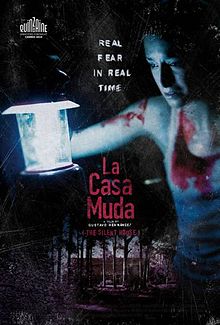 This 2010 Latin American no-budgeter was shot entirely in real time and a single continuous take. Interesting approach, but the film just isn’t very good.
This 2010 Latin American no-budgeter was shot entirely in real time and a single continuous take. Interesting approach, but the film just isn’t very good.
THE SILENT HOUSE (LA CASA MUDA) was based on an allegedly true incident that occurred in Uruguay in the late 1940s. The film, from debuting writer-director Gustavo Hernandez, was successful enough that Uruguay submitted it as that country’s official entry for the 2011 Academy Awards. Unsurprisingly, it wasn’t nominated.
Equally unsurprising was the fact that an American remake followed within a year of THE SILENT HOUSE’S release. That remake, in a VERY rare occurrence, is actually superior to the original.
Laura is a naïve young woman who travels with her father to clean out an old country house. That night, as she and her father are about to go to sleep, Laura hears a strange noise emanating from the second floor. She begs her father to investigate and he does. He doesn’t come back, however, and Laura becomes freaked out.
Lantern in hand, she ascends the stairs—and finds her father’s bloody corpse! She also sees a burly male figure from whom she hides under a table, before breaking out of the house and flagging down a car on the road outside.
The car, it turns out, is driven by Laura’s uncle, who happens to be en route to the house. He continues on his way, promising to investigate the premises. He tells Laura to wait in the car but she follows him back inside the house, where more scares await, as well as a dark revelation involving Laura’s past—and the real perpetrator of all the madness…
This film, with its roving handheld camerawork and stark, shadowy lighting, is skillfully visualized without question. The single take conceit is obviously no longer as novel as it once was, but director Gustavo Hernandez pulls it off in effectively unobtrusive fashion. The script is also fairly clever in the manner it weaves quite a few campfire story mainstays (such as the man leaving the terrified heroine alone and not returning) into its minimalist narrative.
Yet a film like this one is dependent on the strength of its lead actress, seeing as how she’s in every shot. The Hollywood version benefited from the engaging and charismatic Elizabeth Olsen in the lead, while this film has Florencia Colucci, who’s far from exceptional. It doesn’t help that her part is woefully underwritten, or that Ms. Colucci’s face is nearly always in shadow. I’m also unsure of the wisdom of having a large portion of the action—over 5 minutes’ worth—take place after the end credits.
Vital Statistics
THE SILENT HOUSE (LA CASA MUDA)
Tokio Films/IFC Midnight
Director: Gustavo Hernandez
Producer: Gustavo Rojo
Screenplay: Oscar Estevez, Gustavo Hernandez, Gustavo Rojo
Cinematography: Pedro Luque
Editing: Gustavo Hernandez
Cast: Florencia Colucci, Abel Tripaldi, Gustavo Alonso, Maria Salazar
